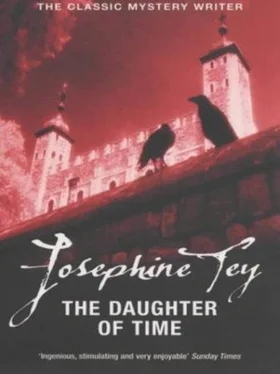Josephine Tey - The Daughter of Time
Здесь есть возможность читать онлайн «Josephine Tey - The Daughter of Time» весь текст электронной книги совершенно бесплатно (целиком полную версию без сокращений). В некоторых случаях можно слушать аудио, скачать через торрент в формате fb2 и присутствует краткое содержание. Год выпуска: 2010, Жанр: Классический детектив, на английском языке. Описание произведения, (предисловие) а так же отзывы посетителей доступны на портале библиотеки ЛибКат.
- Название:The Daughter of Time
- Автор:
- Жанр:
- Год:2010
- ISBN:нет данных
- Рейтинг книги:5 / 5. Голосов: 1
-
Избранное:Добавить в избранное
- Отзывы:
-
Ваша оценка:
- 100
- 1
- 2
- 3
- 4
- 5
The Daughter of Time: краткое содержание, описание и аннотация
Предлагаем к чтению аннотацию, описание, краткое содержание или предисловие (зависит от того, что написал сам автор книги «The Daughter of Time»). Если вы не нашли необходимую информацию о книге — напишите в комментариях, мы постараемся отыскать её.
The Daughter of Time — читать онлайн бесплатно полную книгу (весь текст) целиком
Ниже представлен текст книги, разбитый по страницам. Система сохранения места последней прочитанной страницы, позволяет с удобством читать онлайн бесплатно книгу «The Daughter of Time», без необходимости каждый раз заново искать на чём Вы остановились. Поставьте закладку, и сможете в любой момент перейти на страницу, на которой закончили чтение.
Интервал:
Закладка:
The Midget did not know what an Attainder was, and made it clear that she did not care.
‘It’s becoming an obsession with you, that thing,’ she said, leaning her head at the portrait. ‘It’s not healthy. Why don’t you read some of those nice books?’
Even Marta, whose visit he had looked forward to so that he could put this odd, new proposition to her and see her reaction, even Marta was too full of wrath with Madeleine March to pay any attention to him.
‘After practically promising me that she would write it! After all our get-together and my plans for when this endless thing finally comes to an end. I had even talked to Jacques about clothes! And now she decides that she must write one of her awful little detective stories. She says she must write it while it is fresh – whatever that is.’
He listened to Marta’s grieving with sympathy – good plays were the scarcest commodity in the world and good playwrights worth their weight in platinum – but it was like watching something through a window. The fifteenth century was more actual to him this morning than any on-goings in Shaftesbury Avenue.
‘I don’t suppose it will take her long to write her detective book,’ he said comfortingly.
‘Oh, no. She does them in six weeks or so. But now that she’s off the chain how do I know that I’ll ever get her on again. Tony Savilla wants her to write a Marlborough play for him, and you know what Tony is when he sets his heart on something. He’d talk the pigeons off the Admiralty Arch.’
She came back to the Attainder problem, briefly, before she took her leave.
‘There’s sure to be some explanation, my dear,’ she said from the door.
Of course there’s an explanation, he wanted to shout after her, but what is it? The thing is against all likelihood and sense. Historians say that the murder caused a great revulsion of feeling against Richard, that he was hated for the crime by the common people of England, and that was why they welcomed a stranger in his place. And yet when the tale of his wrongdoing is placed before Parliament there is no mention of the crime.
Richard was dead when that complaint was drawn up, and his followers in flight or exile; his enemies were free to bring against him any charge they could think of. And they had not thought of that spectacular murder .
Why?
The country was reputedly ringing with the scandal of the boys’ disappearance. The very recent scandal. And when his enemies collected his alleged offences against morality and the State they had not included Richard’s most spectacular piece of infamy.
Why?
Henry needed every small featherweight of advantage in the precarious newness of his accession. He was unknown to the country at large and he had no right by blood to be where he was. But he hadn’t used the overwhelming advantage that Richard’s published crime would have given him.
Why?
He was succeeding a man of great reputation, known personally to the people from the Marches of Wales to the Scots border, a man universally liked and admired until the disappearance of his nephews. And yet he omitted to use the one real advantage he had against Richard, the unforgivable, the abhorred thing.
Why?
Only The Amazon seemed concerned about the oddity that was engaging his mind; and she not out of any feeling for Richard but because her conscientious soul was distressed at any possibility of mistake. The Amazon would go all the way down the corridor and back again to tear off a page in a loose-leaf calendar that someone had forgotten to remove. But her instinct to be worried was less strong than her instinct to comfort.
‘You don’t need to worry about it,’ she said, soothing. ‘There’ll be some quite simple explanation that you haven’t thought of. It’ll come to you sometime when you’re thinking of something else altogether. That’s usually how I remember where something I’ve mislaid is. I’ll be putting the kettle on in the pantry, or counting the sterile dressings as Sister doles them out, and suddenly I’ll think: “Goodness, I left it in my burberry pocket.” Whatever the thing was, I mean. So you don’t have to worry about it.’
Sergeant Williams was in the wilds of Essex helping the local constabulary to decide who had hit an old shopkeeper over the head with a brass scale-weight and left her dead among the shoelaces and liquorice all-sorts, so there was no help from the Yard.
There was no help from anyone until young Carradine turned up again three days later. Grant thought that his normal insouciance had a deeper tinge than usual; there was almost an air of self-congratulation about him. Being a well-brought-up child he inquired politely about Grant’s physical progress, and having been reassured on that point he pulled some notes out of the capacious pocket of his coat and beamed through his horn-rims at his colleague.
‘I wouldn’t have the sainted More as a present,’ he observed pleasantly.
‘You’re not being offered him. There are no takers.’
‘He’s away off the beam. Away off.’
‘I suspected as much. Let us have the facts. Can you begin on the day Edward died?’
‘Sure. Edward died on April the 9th 1483. In London. I mean, in Westminster; which wasn’t the same thing then. The Queen and the daughters were living there, and the younger boy, I think. The young Prince was doing lessons at Ludlow Castle in charge of the Queen’s brother, Lord Rivers. The Queen’s relations are very much to the fore, did you know? The place is just lousy with Woodvilles.’
‘Yes, I know. Go on. Where was Richard?’
‘On the Scottish border.’
‘What!’
‘Yes, I said: on the Scottish border. Caught away off base. But does he yell for a horse and go posting off to London? He does not.’
‘What did he do?’
‘He arranged for a requiem mass at York, to which all the nobility of the North were summoned, and in his presence took an oath of loyalty to the young Prince.’
‘Interesting,’ Grant said dryly. ‘What did Rivers do? The Queen’s brother?’
‘On the 24th of April he set out with the Prince for London. With two thousand men and a large supply of arms.’
‘What did he want the arms for?’
‘Don’t ask me. I’m only a Research Worker. Dorset, the elder of the Queen’s two sons by her first marriage, took over both the arsenal and the treasure in the Tower and began to fit up ships to command the Channel. And Council orders were issued in the name of Rivers and Dorset – avunculus Regis and frater Regis uterinus respectively – with no mention of Richard. Which was decidedly off-colour when you remember – if you ever knew – that in his will Edward had appointed Richard guardian of the boy and Protector of the Kingdom in case of any minority. Richard alone, mind you, without a colleague.’
‘Yes, that is in character, at least. He must always have had complete faith in Richard. Both as a person and as an administrator. Did Richard come south with a young army too?’
‘No. He came with six hundred gentlemen of the North, all in deep mourning. He arrived at Northampton on April the 29th. He had apparently expected to join up with the Ludlow crowd there; but that is report and you have only a historian’s word for it. But the Ludlow procession – Rivers and the young Prince – had gone on to Stoney Stratford without waiting for him. The person who actually met him at Northampton was the Duke of Buckingham with three hundred men. Do you know Buckingham?’
‘We have a nodding acquaintance. He was a friend of Edward’s.’
‘Yes. He arrived post haste from London.’
‘With the news of what was going on.’
‘It’s a fair deduction. He wouldn’t bring three hundred men just to express his condolences. Anyhow a Council was held there and then – he had all the material for a proper Council in his own train and Buckingham’s, and Rivers and his three aides were arrested and sent to the North, while Richard went on with the young Prince to London. They arrived in London on the 4th of May.’
Читать дальшеИнтервал:
Закладка:
Похожие книги на «The Daughter of Time»
Представляем Вашему вниманию похожие книги на «The Daughter of Time» списком для выбора. Мы отобрали схожую по названию и смыслу литературу в надежде предоставить читателям больше вариантов отыскать новые, интересные, ещё непрочитанные произведения.
Обсуждение, отзывы о книге «The Daughter of Time» и просто собственные мнения читателей. Оставьте ваши комментарии, напишите, что Вы думаете о произведении, его смысле или главных героях. Укажите что конкретно понравилось, а что нет, и почему Вы так считаете.












